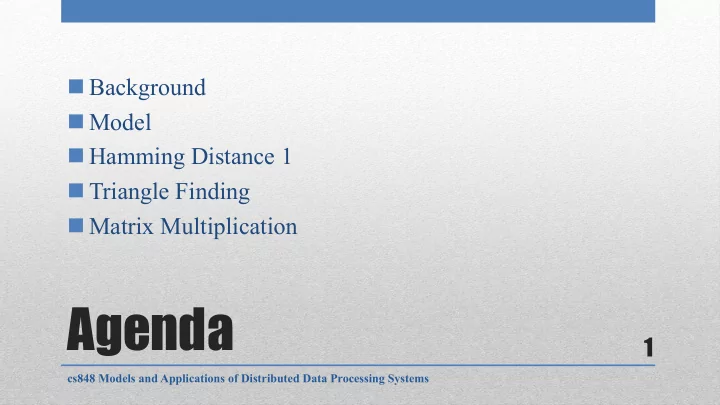

n Background n Model n Hamming Distance 1 n Triangle Finding n Matrix Multiplication Agenda 1 cs848 Models and Applications of Distributed Data Processing Systems
The Problem • Tradeoff between parallelism and communication cost in a map-reduce computation. • The finer we partition the work of the reducers so that more parallelism can be extracted, the greater will be the total communication between mappers and reducers. • Limited bandwidth • Limited resources(memory, processing units…) Background 2 cs848 Models and Applications of Distributed Data Processing Systems
Why important • Explore the bounds on the cost of map-reduce computation. • Optimize the algorithms for problem. Background 3 cs848 Models and Applications of Distributed Data Processing Systems
Previous Work • First work that addresses the tradeoff between reducer size and communication cost in one round Map-Reduce computations. • Theta-join implementation by Map-Reduce: only one special case. • Limit the input size of any reducer: limits consideration to algorithms that we might think of as truly parallel. • … Background 4 cs848 Models and Applications of Distributed Data Processing Systems
• A model of problems that can be solved in a single round of map-reduce computation. Two Parameters • Replication rate r : average number of key-value pairs to which each input is mapped by the mappers. • Reducer size p : the maximum number of inputs that one reducer can receive. Model 5 cs848 Models and Applications of Distributed Data Processing Systems
r = 2 p = 4 Model 6 cs848 Models and Applications of Distributed Data Processing Systems
Tradeoff • Determine the best algorithm for a problem where: r = f ( q ) • Cost of solving the problem: af ( q ) + bq ( + cq 2 ) • Replication rate: p q i ∑ r = I Model i = 1 7 cs848 Models and Applications of Distributed Data Processing Systems
Mapping Schemas • No reducer is assigned more than q inputs. • For every output, there is (at least) one reducer that is assigned all of the inputs for that output. We say such a reducer covers the output. This reducer need not be unique, and it is permitted that these same inputs are assigned also to other reducers. Model 8 cs848 Models and Applications of Distributed Data Processing Systems
Model 9 cs848 Models and Applications of Distributed Data Processing Systems
Steps : Q1: Is this assumption reasonable? Model Q2: Can be applied to most problems or only 10 several specific problem? cs848 Models and Applications of Distributed Data Processing Systems
Model 11 cs848 Models and Applications of Distributed Data Processing Systems
Model 12 cs848 Models and Applications of Distributed Data Processing Systems
proof in technical report: F. N. Afrati, A. D. Sarma, S. Salihoglu, and J. D. Ullman. Upper and lower bounds on the cost of a map-reduce computation. CoRR, abs/1206.4377, 2012. Hamming Distance 1 13 cs848 Models and Applications of Distributed Data Processing Systems
Hamming Distance 1 14 cs848 Models and Applications of Distributed Data Processing Systems
Upper Bound: Splitting Algorithm Hamming Distance 1 15 cs848 Models and Applications of Distributed Data Processing Systems
Upper Bound for large q: Replicas on neighboring reducer Hamming Distance 1 16 cs848 Models and Applications of Distributed Data Processing Systems
• Analysis for Hamming Distance 1 does not generalize easily to higher distance. • Much higher bound for number of outputs covered by a reducer. Hamming Distance 1 17 cs848 Models and Applications of Distributed Data Processing Systems
• We are given a graph as input and want to find all triples of nodes such that in the graph there are edges between each pair of these three nodes. • Alon Class of Sample Graphs: have the property that we can partition the nodes into disjoint sets, such that the subgraph induced by each partition is either: A single edge between two nodes, or - - Contains an odd-length Hamiltonian cycle. Triangle Finding 18 cs848 Models and Applications of Distributed Data Processing Systems
Matrix Multiplication 19 cs848 Models and Applications of Distributed Data Processing Systems
Matrix Multiplication Using Two Phases Matrix Multiplication 20 cs848 Models and Applications of Distributed Data Processing Systems
• http://www.slideshare.net/tzulitai/upper-and-lower- bound-on-the-cost-of-a-map-reduce-computation • http://shonan.nii.ac.jp/shonan/seminar011/files/2012/01/ ullman.pdf Reference 21 cs848 Models and Applications of Distributed Data Processing Systems
Q&A Thank you 22 cs848 Models and Applications of Distributed Data Processing Systems
Recommend
More recommend